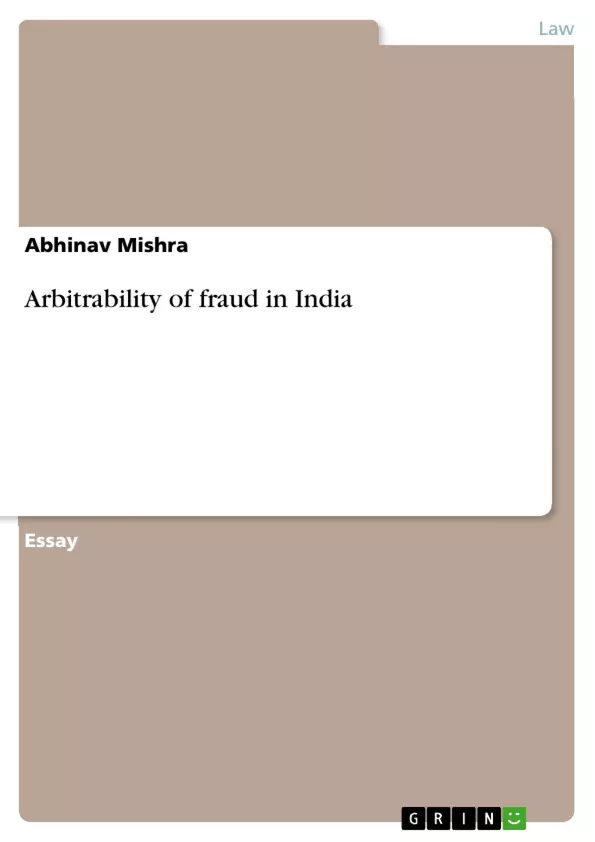An arbitration agreement is barred to the jurisdiction of civil courts under section 8 of the Indian Arbitration and Conciliation Act, 1996 (hereinafter, the Act) since the parties agree to settle disputes by a mechanism other than the ordinary court proceedings i.e. arbitration and such an agreement is not hit by sec 28 of Indian Contract Act, 1872.
However, a legitimate question arises whether a civil court can try those cases where the agreement is itself tainted by the elements of fraud. This issue has been dealt with comprehensively by the courts and has been settled, to a certain extent, by the Supreme Court in the case of A. Ayyasamy vs A. Paramasivam.
The essay shall briefly deal with the cases which spurred the debate over arbitrability of fraud along with suggestions for further improvement.
Inhaltsverzeichnis (Table of Contents)
- Introduction
- Mandatory nature of sec 8
- Principle of separability
- Courts unnecessarily poking their nose?
- Maestro to Ayyasamy
- Serious issues of fraud and mere allegations of fraud
- Void and voidable contract
- Departing from Booz Allen's Test
- Way Forward
- Conclusion
Zielsetzung und Themenschwerpunkte (Objectives and Key Themes)
This essay examines the arbitrability of fraud in India, specifically focusing on the Supreme Court's decision in the case of A. Ayyasamy vs A. Paramasivam. It aims to discuss the evolution of judicial interpretation concerning this issue, analyzing key cases and offering suggestions for future development.
- The mandatory nature of Section 8 of the Arbitration and Conciliation Act, 1996
- The principle of separability and its application to arbitration agreements
- The impact of the Supreme Court's decisions in Maestro Engineers and Ayyasamy on the arbitrability of fraud
- The distinction between "serious issues of fraud" and "mere allegations of fraud"
- The applicability of the Booz Allen test to cases involving fraud
Zusammenfassung der Kapitel (Chapter Summaries)
- Introduction: This chapter introduces the topic of arbitrability of fraud and outlines the essay's scope. It highlights the role of Section 8 of the Arbitration and Conciliation Act, 1996, and the importance of the Supreme Court's decision in Ayyasamy.
- Mandatory nature of sec 8: This chapter discusses the mandatory nature of Section 8 of the Act, which empowers judicial authorities to refer disputes to arbitration when an arbitration agreement exists. It analyzes the discretion granted to courts in determining the validity of the arbitration agreement.
- Principle of separability: This chapter explores the principle of separability, which states that the validity of an arbitration clause is independent of the main contract. It examines the legal framework for this principle in India and the relevant case law.
- Courts unnecessarily poking their nose?: This chapter discusses the Supreme Court's interventionist role in interpreting Section 8 of the Act, specifically focusing on the decision in S.B.P. & Co. v. Patel Engineering. It analyzes the court's authority to determine jurisdictional issues before referring disputes to arbitration.
- Maestro to Ayyasamy: This chapter delves into the Supreme Court's decisions in Maestro Engineers and Ayyasamy, which addressed the issue of fraud in the context of arbitration agreements. It examines the court's evolving stance on the arbitrability of fraud and the factors considered in determining whether a case should be referred to arbitration.
- Serious issues of fraud and mere allegations of fraud: This chapter discusses the distinction between "serious issues of fraud" and "mere allegations of fraud" as established by some High Courts. It analyzes the criteria for determining when allegations of fraud warrant judicial intervention.
- Void and voidable contract: This chapter examines the distinction between void and voidable contracts under the Indian Contract Act, 1872. It analyzes the implications of this distinction for the arbitrability of fraud.
- Departing from Booz Allen's Test: This chapter explores the Booz Allen test, which sets forth criteria for determining the arbitrability of disputes. It discusses the applicability of this test to cases involving fraud and examines any potential contradictions.
Schlüsselwörter (Keywords)
The main keywords and focus topics of the text include arbitrability of fraud, Section 8 of the Arbitration and Conciliation Act, 1996, principle of separability, Supreme Court decisions, Maestro Engineers, Ayyasamy, serious issues of fraud, mere allegations of fraud, void and voidable contracts, Booz Allen test, judicial intervention, and arbitration agreement.
Frequently Asked Questions
Is fraud arbitrable in India?
Yes, following the Supreme Court decision in A. Ayyasamy vs A. Paramasivam, fraud is generally arbitrable unless there are serious, complex allegations that require extensive evidence in a civil court.
What is Section 8 of the Indian Arbitration Act?
Section 8 mandates that a judicial authority refer parties to arbitration if an arbitration agreement exists, barring the jurisdiction of civil courts for those disputes.
What is the principle of separability?
It states that the arbitration clause is an independent agreement. Even if the main contract is alleged to be void or tainted by fraud, the arbitration agreement can remain valid.
What is the difference between "serious" and "mere" allegations of fraud?
Mere allegations of fraud do not stop arbitration. Only serious allegations that make the arbitration agreement itself voidable may lead a court to intervene.
What is the Booz Allen test?
It is a legal test used to determine which types of disputes are "capable of settlement by arbitration" under Indian law.
- Quote paper
- Abhinav Mishra (Author), 2017, Arbitrability of fraud in India, Munich, GRIN Verlag, https://www.grin.com/document/353235



